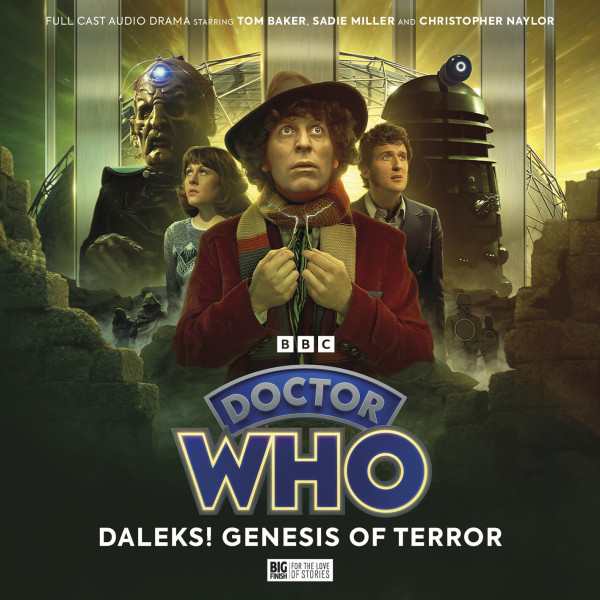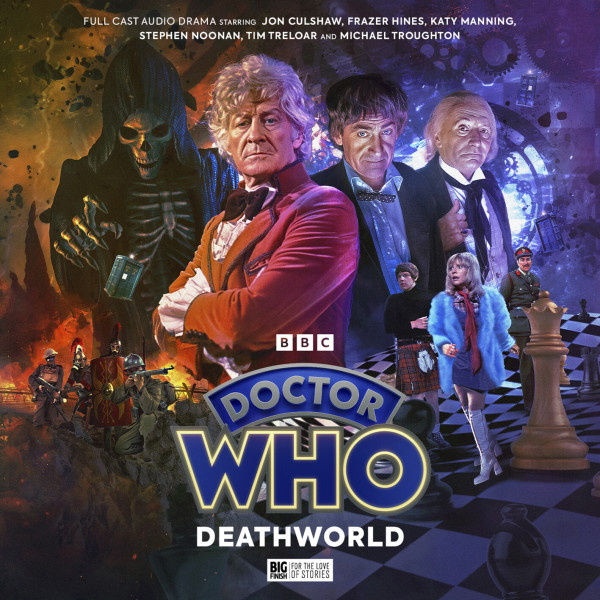Books in series

Doctor Who
The Nightmare Fair
2009

Doctor Who
Mission to Magnus
2009

Doctor Who
Leviathan
2010

Doctor Who
The Hollows of Time
2010

Doctor Who
Paradise 5
2010

Doctor Who
Point of Entry
2010

Doctor Who
The Song of Megaptera
2010

Doctor Who
The Macros
2010

Doctor Who
Prison in Space
2010

Doctor Who
Thin Ice
2011

Doctor Who
Crime of the Century
2011

Doctor Who
Animal
2011

Doctor Who
Earth Aid
2011

Doctor Who
The Elite
2011

Doctor Who
Hexagora
2011

Doctor Who
The Children of Seth
2011

Doctor Who
The Guardians of Prophecy
2012

Doctor Who
Power Play
2012

Doctor Who
The First Sontarans
2012

Doctor Who
The Masters of Luxor
2012

Doctor Who
The Rosemariners
2012

Doctor Who
The Dark Planet
2013

Doctor Who
The Queen of Time
2013

Doctor Who
Lords of the Red Planet
2013

Doctor Who
The Mega
2013

Doctor Who
Nightmare Country
2019

Doctor Who
The Ultimate Evil
2019

Doctor Who
Return of the Cybermen
2021

Doctor Who
The Doomsday Contract
2023

Doctor Who and the Ark
2023

Doctor Who
Daleks! Genesis of Terror
2023

Doctor Who
Deathworld
2024
Authors

Gerry Davis was a British television writer, best known for his contributions to the science-fiction genre. He also wrote for the soap operas Coronation Street and United!. From 1966 until the following year, he was the script editor on the popular BBC science-fiction series Doctor Who, for which he co-created the popular cybernetic monsters known as the Cybermen, who made several appearances in the series over the following twenty-two years. His fellow co-creator of these creatures was the programme's unofficial scientific adviser Dr. Kit Pedler, and following their work on Doctor Who, the pair teamed up again in 1970 when they created a science-fiction programme of their own, Doomwatch. Doomwatch ran for three seasons on BBC One from 1970 to 1972, and also spawned a novel written by Davis and Pedler, and later a cinema film and a 1999 revival on Channel 5. Davis briefly returned to writing Doctor Who, penning the original script for Revenge of the Cybermen, in 1975, though the transmitted version was heavily rewritten by the then script-editor Robert Holmes. He also adapted several of his scripts into novelisations for Target Books. With Kit Pedler, he wrote the science-fiction novels Mutant 59: The Plastic Eaters (1971), Brainrack (1974) and The Dynostar Menace (1975). In the 1980s Davis worked in America both in television and on feature films such as The Final Countdown (1980). In late 1989 he and Terry Nation made a joint but unsuccessful bid to take over production of Doctor Who and reformat the series mainly for the American market. Gerry Davis died on August 31 1991.

Christopher Hamilton Bidmead is a British writer and journalist who wrote several Doctor Who TV serials, all of which he also novelised. He was also script editor for Season 18. He was attached (agreed, but without a contract) to write several serials that were ultimatelly cancelled. They were In the Hollows of Time, a two-part (forty-five minute) story for the cancelled season 23[1], and a four parter, Pinacotheca (a.k.a. The Last Adventure), which would have been the third part of the The Trial of a Time Lord arc[2].


Ben Aaronovitch's career started with a bang writing for Doctor Who, subsided in the middle and then, as is traditional, a third act resurgence with the bestselling Rivers of London series. Born and raised in London he says that he'll leave his home when they prise his city out of his cold dead fingers.

Brian Hayles (7 March 1931 - 30 October 1978) was born in Portsmouth, Hampshire, England. His body of work as a writer for television and film, most notably for the BBC science fiction series Doctor Who, lasted from 1963 to 1989. Hayles wrote six stories for Doctor Who and is best known for his creation of the Celestial Toymaker in the 1966 story of the same name, the Ice Warriors, introduced in the 1967 story of the same name, and the feudal planet Peladon, the setting for The Curse of Peladon and its sequel The Monster of Peladon. His other stories were The Smugglers and The Seeds of Death. In addition to script writing for the radio series The Archers, Hayles penned a novel based on the soap called Spring at Brookfield (Tandem, 1975) set in the period between the two world wars. His other books included novelisations of his Doctor Who serials The Curse of Peladon (Target, 1974) and The Ice Warriors (Target, 1976), an adaptation of his scripts for the BBC drama The Moon Stallion (Mirror Books, 1978), and two horror plays for children, The Curse of the Labyrinth (Dobson, 1976) and Hour of the Werewolf (Dobson, 1976). An original novel entitled Goldhawk (NEL, 1979) was published posthumously. Apart from Doctor Who, Hayles wrote for such television series as The Regiment, Barlow at Large, Doomwatch, Out of the Unknown, United!, Legend of Death, Public Eye, Z-Cars, BBC Playhouse, The Wednesday Thriller and Suspense. He also wrote the screenplays for the feature films Nothing But the Night (1972) and Warlords of Atlantis (1978). The novelisation of the latter by Paul Victor (Futura, 1978) included a preface by Hayles entitled 'The Thinking Behind Atlantis' in which he explained the origins of the film's central concepts. Hayles' final screenplay was for Arabian Adventure (1979), which he completed shortly before his death on 30 October 1978. The novelisation of the film by Keith Miles (Mirror Books, 1979) was dedicated to his memory.


Paul Finch is a former cop and journalist, now full-time writer. Having originally written for the television series THE BILL plus children's animation and DOCTOR WHO audio dramas, he went on to write horror, but is now best known for his crime / thriller fiction. He won the British Fantasy Award twice and the International Horror Guild Award, but since then has written two parallel series of hard-hitting crime novels, the Heck and the Lucy Clayburn novels, of which three titles have become best-sellers. Paul lives in Wigan, Lancashire, UK with his wife and children.

Terry Nation was a Welsh screenwriter and novelist. After briefly joining his father's furniture-making business and attempting stand-up comedy, Nation turned his hand to writing and worked on radio scripts for The Goon Show and a range of TV dramas such as The Saint, The Avengers, Z Cars, The Baron, The Champions, Department S and The Persuaders. He went on to write about 100 episodes of Doctor Who and wrote scripts for the American TV series MacGyver (1985) and A Fine Romance (1989). He is probably best known for creating iconic villains the Daleks in the long-running science fiction television series Doctor Who. Nation also created two science-fiction shows - Survivors and Blake's 7. Terry Nation moved to Los Angeles, California, United States in 1980. He died from emphysema on 9 March 1997, aged 66.

Wally K. Daly is an English writer for television and radio and one time chairman of the Writers' Guild of Great Britain As well as some minor acting roles including Z-Cars, his writing credits include Juliet Bravo, Casualty and Byker Grove. He also wrote the 1984 radio series Anything Legal featuring Donald Hewlett and Michael Knowles. Daly also wrote a story for Doctor Who called The Ultimate Evil but due to its hiatus the story was cancelled but was published in the popular range of Who books. In the early 1980s, three of his stage plays were performed at the Queen's Theatre, Hornchurch - The Miracle Shirker, Vaughan Street (both 1980) and a stage adaptation of his radio and television play Butterflies Don't Count (1982)

John Hardress Wilfred Lloyd CBE is a British comedy writer and television producer. Lloyd was Trinity College, Cambridge, where he befriended and later shared a flat with Douglas Adams. He worked as a radio producer at the BBC 1974–1978 and created The News Quiz, The News Huddlines, To The Manor Born (with Peter Spence) and Quote... Unquote (with Nigel Rees). He wrote Hordes of the Things with Andrew ("A. P. R.") Marshall, co-authored two episodes of Doctor Snuggles with Douglas Adams and then went on to co-write the fifth and sixth episodes of the first radio series of The Hitchhiker's Guide to the Galaxy with him. Lloyd then worked as a TV producer at both the BBC and ITV 1979–1989 where he created Not the Nine O'Clock News (with Sean Hardie) and Spitting Image (with Peter Fluck and Roger Law). He also produced all 4 Blackadder series. Lloyd was originally to have been the host of BBC topical news quiz Have I Got News For You, but was replaced by Angus Deayton. His first new TV series for 14 years, QI (short for Quite Interesting, and a deliberate reversal of IQ), starring Stephen Fry and Alan Davies, began on 11 September 2003 at 10pm on BBC2 for a run of 12 episodes. In its eighth series, which started on BBC One in September 2010, Lloyd appeared as a panelist in one of the episodes. All the episodes of QI (including the pilot) have been directed by Ian Lorimer. Lloyd currently presents the radio series, The Museum of Curiosity (2008), which he co-created with producers Richard Turner & Dan Schreiber and former co-host Bill Bailey. Lloyd was appointed Commander of the Order of the British Empire (CBE) in the 2011 New Year Honours for services to broadcasting.

Pat Mills, born in 1949 and nicknamed 'the godfather of British comics', is a comics writer and editor who, along with John Wagner, revitalised British boys comics in the 1970s, and has remained a leading light in British comics ever since. His comics are notable for their violence and anti-authoritarianism. He is best known for creating 2000 AD and playing a major part in the development of Judge Dredd.

Marc Platt is a British writer. He is most known for his work with the BBC science fiction television series Doctor Who. After studying catering at a technical college, Platt worked first for Trust House Forte, and then in administration for the BBC. He wrote the Doctor Who serial Ghost Light based on two proposals, one of which later became the novel Lungbarrow. That novel was greatly anticipated by fans as it was the culmination of the so-called "Cartmel Masterplan", revealing details of the Doctor's background and family. After the original series' cancellation Platt wrote the script for the audio Doctor Who drama Spare Parts. The script was the inspiration for the 2006 Doctor Who television story "Rise of the Cybermen"/"The Age of Steel", for which Platt received a screen credit and a fee. He lives in London.
David Ralph Martin was an accomplished television and film writer. He contributed numerous scripts for the Doctor Who television series between 1971 and 1979 in collaboration with Bob Baker. Baker and Martin's most notable contributions to the Doctor Who mythos were probably the robot computer K-9 (created for The Invisible Enemy) and the renegade Time Lord Omega (created for The Three Doctors, Doctor Who's tenth anniversary story).Together they were nicknamed "The Bristol Boys" by the Doctor Who production teams with whom they worked. They also worked together on the 1975 children's science fantasy television serial Sky and Into the Labyrinth. In the early 1980s, Martin wrote a series of 4 small illustrated children's stories starring K9. In 1986, he wrote the Doctor Who Make Your Own Adventure book Search for the Doctor.

Stoker and World Fantasy Award nominee, winner of British Fantasy and International Horror Guild Awards for his short fiction, Stephen Gallagher has a career both as a novelist and as a creator of primetime miniseries and episodic television. His fifteen novels include Chimera, Oktober, Valley of Lights and Nightmare, with Angel. He's the creator of Sebastian Becker, Special Investigator to the Lord Chancellor's Visitor in Lunacy, in a series of novels that includes The Kingdom of Bones, The Bedlam Detective, and The Authentic William James. In his native England he's adapted and created hour-long and feature-length thrillers and crime dramas. In the US he was lead writer on NBC's Crusoe, creator of CBS Television's Eleventh Hour, and Co-Executive Producer on ABC's The Forgotten. Recent screen credits include an award-winning Silent Witness and Stan Lee's Lucky Man. He began his TV career as a writer on two seasons of Doctor Who, and wrote two novelizations of his stories under the pseudonym John Lydecker. ** Photo by Lisa Bowerman **
